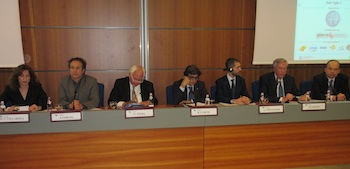Sega’s international sales manager Maria Carmen Villarroya has called upon the Italian authorities to reform regulations she claimed are damaging the country’s amusement industry.

During a panel discussion organised by trade association SAPAR at this week’s ENADA Spring show in Rimini, leading industry figures urged the government to enact new regulations for video games separate to anything in place that groups such machines together with gambling devices.
“Sega has been developing games since the 1970s and Italy has been one of the major markets for us for many years,” Villarroya (pictured, left) said. “However, all of us here share a common concern and that is the weakened state of the pure amusement machine sector in Italy. It is clear for all to see that the amusement machine sector in Italy has been neglected by the relevant authorities.”
The position of the country’s amusement operators and machine manufacturers has been “completely ignored,” she said. Technology has now evolved, but the decree that regulates the sector has not. Consumer and PC games can now be played online and mobile games are freely available in Italy, but such technology is not allowed to be used in the coin-operated video games market.
“This industry has proved time after time that we welcome and embrace fair competition with open arms but unfair competition is something that should not be acceptable to anyone, especially when it is caused by government regulations that are simply uneasy to change,” she asserted. “Neither the Italian authorities, nor we as an industry, should be expected to simply sit back and accept the situation as the status quo.”
She called upon the authorities to “address the evident imbalance” by reviewing and making more flexible the existing Comma 7c regulations in order to help the industry to compete and to promote growth.
“With the restrictions imposed in Comma 7c, Italy is the only country in the world where game developers have been forced to modify the software of games to meet the requirements of the decree, which is costly, time consuming and, I dare say, pointless. The actual decree leaves no room for new technologies or innovation within the gameplay itself.
“The restrictions within the decree mean ultimately there is less choice for Italian operators, which severely restricts the operator in his ability to compete in a fast-moving, ever-changing and unfairly competitive leisure market.
“We believe it is essential that the Italian government takes immediate steps to reform Comma 7c to enable domestic machine operators, exhibitors and manufacturers to have a future and continue to provide employment for many throughout the 21st century and beyond.”
The ENADA Spring show closes today.
A full report will be included in a forthcoming issue of InterGame.

